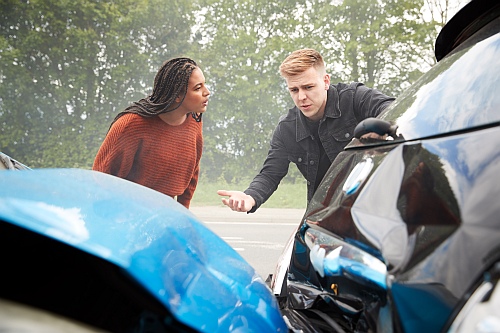Uninsured drivers remain a major problem in the state of Georgia. In fact, a recent study conducted by the Insurance Research Council showed that in 2012 between nine and 11 percent of motorists in Georgia were uninsured. Legal woes that arise from accidents with those who are and become uninsured are at the center of a recent decision from the Court of Appeals of Georgia, Castellanos v. Travelers Home & Marine Insurance Company.
As you might not have expected, both drivers in Castellanos were insured at the time of the accident. The wreck at issue occurred in late September 2009 and was a result of the negligence of the defendant in this case. The plaintiff driver brought suit against the defendant driver and his insurance company, United Automobile Insurance Company, in the State Court of Gwinnett County and served Travelers Insurance, as his uninsured-motorist insurance carrier. United provided legal defense for the defendant, but the defendant did not cooperate in the suit and failed to even attend the trial. Following trial, the jury returned a verdict in favor of the plaintiff for $7,000 in compensatory and punitive damages, and thereafter the plaintiff demanded payment from United. United, however, denied coverage, arguing that the defendant had not cooperated in the case, as was required by the terms of his insurance agreement, and thus United was entitled to deny him coverage.
The plaintiff then made a demand to Travelers for uninsured motorist coverage, since the defendant was now, as a result of his lack of cooperation, uninsured. Travelers refused to pay, and the plaintiff brought a separate claim against Travelers, alleging that Travelers’ refusal to pay was in bad faith. Travelers maintained that there was no evidence United’s denial of coverage was a legal denial, and therefore the defendant was not an uninsured motorist, as defined by the terms of the uninsured-motorist policy. The court then granted summary judgment to Travelers, finding that the plaintiff had failed to provide evidence that United had legally denied coverage. The plaintiff then appealed.
The Court of Appeals, however, disagreed with the trial court’s assessment of the facts and reversed. First, looking to the terms of the uninsured motorist carrier policy and the statutory definition of uninsured motorist, the court determined that a motorist could retroactively become uninsured to the date of an accident if his or her insurance carrier “legally” denies coverage. See Southern General Ins. Co. v. Thomas, 197 Ga. App. 196, 197 (397 SE2d 624) (1990). Since cooperation clauses are legally enforceable in Georgia, Vaughan v. ACCC Ins. Co., 314 Ga. App. 741, 742 (2) (725 SE2d 855) (2012), the defendant’s failure to cooperate could serve as a basis for the legal denial of insurance coverage. Although the trial court found that the plaintiff failed to provide evidence that this denial of coverage was legal to substantiate his claim to uninsured motorist coverage, the Court of Appeals held that the trial court had inappropriately shifted the burden. Once the plaintiff had met the threshold burden of showing that he was entitled to uninsured motorist benefits by way of United’s denial, the burden was on Travelers to prove its affirmative defense by showing that United had not legally denied coverage. Thus, the burden is on the uninsured motorist provider to prove that the denial was improper and not on the motorist seeking benefits to prove that the denial was legal. Accordingly, the Court of Appeals reversed the grant of summary judgment and remanded the case to the trial court for trial.
Although this morass of insurance policies and legal filings did ultimately lead to a favorable judgment for this aggrieved motorist, one can clearly see that compulsory motor vehicle insurance does not always lead to smooth recovery. Indeed, although both motorists were technically insured at the time of their accident, the plaintiff has still had to wrangle with two different insurance providers in order to get the recovery to which he is entitled. Thus, if you have been recently injured in an Atlanta motor vehicle accident and are considering bringing suit against a negligent driver, it is in your interest to get guidance from knowledgeable legal counsel. The Law Office of Terrence R. Bethune has experience representing injured drivers in actions against both insurance providers and negligent drivers and is ready to offer the legal advice you may need. Feel free to contact us for a free case evaluation. We look forward to your call.
Subject Related Articles

Navigating Macon Car Accident Claims: Step-by-Step Guide
You’ve been in a Macon car accident, and now you’re faced with insurance claims, police reports, car repairs, and more. It can feel overwhelming trying
June 24, 2024

Avoid These Mistakes After a Car Accident in Carrollton
You’ve just been in a car accident in Carrollton. Even minor fender benders can be stressful events. But before you step out of the car
May 20, 2024

What to Do After a Hit-and-Run Accident
So you’ve just been in a hit-and-run accident. Your first thought is probably to chase down the other driver, but that may not be the
April 19, 2024





